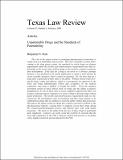| dc.contributor.author | Roin, Benjamin N. | |
| dc.date.accessioned | 2013-05-07T17:28:38Z | |
| dc.date.issued | 2009 | |
| dc.identifier | Quick submit: 2013-05-07T12:34:15-04:00 | |
| dc.identifier.citation | Benjamin N. Roin, Unpatentable Drugs and the Standards of Patentability, 87 Texas L. Rev., 503 (2009). | en_US |
| dc.identifier.issn | 0040-4411 | en_US |
| dc.identifier.uri | http://nrs.harvard.edu/urn-3:HUL.InstRepos:10611775 | |
| dc.description.abstract | The role of the patent system in promoting pharmaceutical innovation is widely seen as a tremendous success story. This view overlooks a serious shortcoming in the drug patent system: the standards by which drugs are deemed unpatentable under the novelty and non-obviousness requirement bear little relationship to the social value of those drugs or the need for a patent to motivate their development. If the idea for a drug is not novel or is obvious, perhaps because it was disclosed in an earlier publication or made to look obvious by recent scientific advances, then it cannot be patented. Yet the mere idea for a drug alone is generally of little value to the public. Without clinical trials proving the drug's safety and efficacy, a prerequisite for FDA approval and acceptance by the medical community, it is unlikely to benefit the public. Given the immense investment needed to fund clinical trials on drugs, and the ability of generic manufacturers to rely on those tests to secure regulatory approval for their own products, pharmaceutical companies are rarely willing to develop a drug without patent protection. The novelty and non-obviousness requirements make no concession for the development costs of inventions, and thus withhold patents from drugs that are unlikely to reach the public without that protection. This gap in the patent system for drugs has created a pervasive problem in the pharmaceutical industry, causing firms to regularly screen through their drugs in R&D and discard ones with weak patent protection. The potential harm to the public from the loss of these drugs is likely significant. Congress can easily avoid this problem by ensuring that the successful completion of the FDA's rigorous clinical trial process is rewarded with a lengthy exclusivity period enforced by the FDA. | en_US |
| dc.language.iso | en_US | en_US |
| dc.publisher | University of Texas School of Law | en_US |
| dc.relation.hasversion | http://papers.ssrn.com/sol3/papers.cfm?abstract_id=1127742 | en_US |
| dash.license | OAP | |
| dc.title | Unpatentable Drugs and the Standards of Patentability | en_US |
| dc.type | Journal Article | en_US |
| dc.date.updated | 2013-05-07T16:34:20Z | |
| dc.description.version | Version of Record | en_US |
| dc.rights.holder | Benjamin N. Roin | |
| dc.relation.journal | Texas Law Review | en_US |
| dash.depositing.author | Roin, Benjamin N. | |
| dc.date.available | 2013-05-07T17:28:38Z | |
| dash.contributor.affiliated | Roin, Benjamin N. | |


